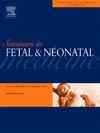Clinical decisions in fetal-neonatal neurology II: Gene-environment expression over the first 1000 days presenting as “four great neurological syndromes”
Abstract
Interdisciplinary fetal-neonatal neurology (FNN) training considers a woman's reproductive and pregnancy health histories when assessing the “four great neonatal neurological syndromes”. This maternal-child dyad exemplifies the symptomatic neonatal minority, compared with the silent majority of healthy children who experience preclinical diseases with variable expressions over the first 1000 days. Healthy maternal reports with reassuring fetal surveillance testing preceded signs of fetal distress during parturition. An encephalopathic neonate with seizures later exhibited childhood autistic spectrum behaviors and intractable epilepsy correlated with identified genetic biomarkers. A systems biology approach to etiopathogenesis guides the diagnostic process to interpret phenotypic form and function. Evolving gene-environment interactions expressed by changing phenotypes reflect a dynamic neural exposome influenced by reproductive and pregnancy health. This strategy considers critical/sensitive periods of neuroplasticity beyond two years of life to encompass childhood and adolescence. Career-long FNN experiences reenforce earlier training to strengthen the cognitive process and minimize cognitive biases when assessing children or adults. Prioritizing social determinants of healthcare for persons with neurologic disorders will help mitigate the global burden of brain diseases for all women and children.

 求助内容:
求助内容: 应助结果提醒方式:
应助结果提醒方式:


